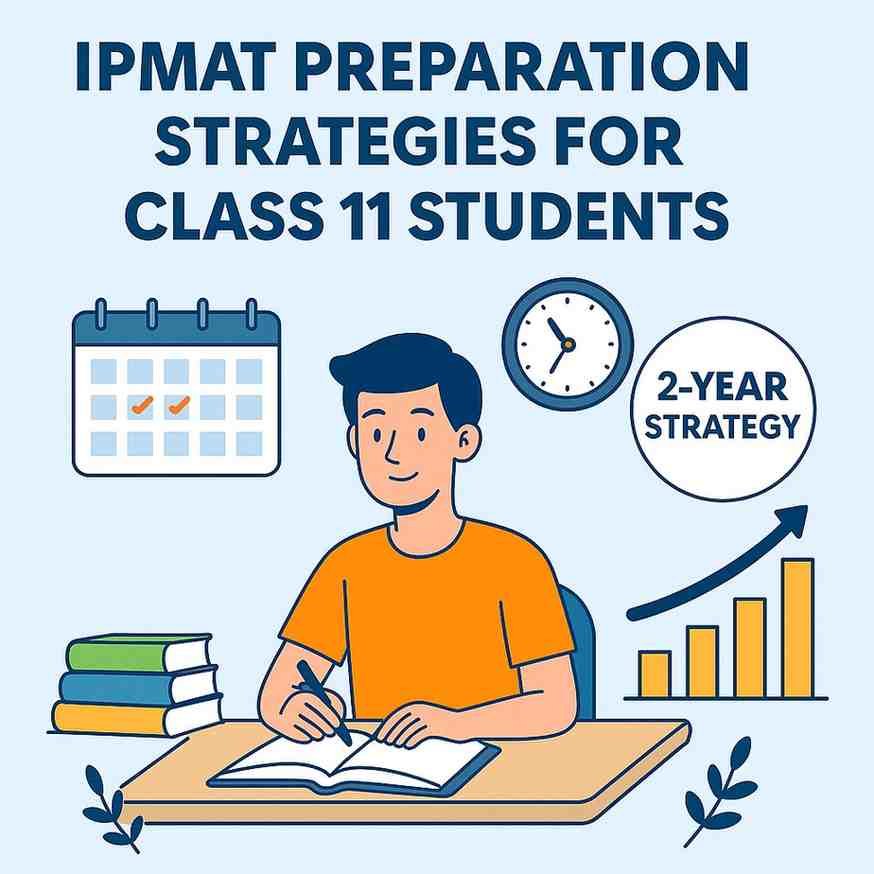IPMAT Preparation for Beginners can feel overwhelming, especially when aiming for prestigious institutes like IIM Indore or IIM Rohtak. The Integrated Program in Management Aptitude Test (IPMAT) is highly competitive, offering a direct path to a five-year dual degree right after Class 12. If you’re new to this journey, this beginner’s guide will help you understand the exam structure, build a focused study plan, and take your first steps with confidence toward success in the IPMAT.
IPMAT Exam Learning
Preparation begins with the initial step of making yourself completely conversant with the syllabus as well as with the trends of the day on the examination as such. The IPMAT, or the Integrated Programme in Management Aptitude Test, mostly tests your:
Quantitative Ability (QA) Mathematical concepts like algebra, arithmetic, geometry, number system, probability, permutations and combinations, and interpretation of data.
Verbal Ability (VA) Para jumbles, para completion, vocabulary based questions, sentence correction, reading comprehension, and grammar.
Logical Reasoning (For IIM Rohtak) Analytical skill, pattern perception, problem solving skill.
The test is held on a mix of multiple choice questions, popularly known as MCQs, and short answer questions, popularly known as SA questions. The institute has set this kind of question pattern as a norm to evaluate the candidates. It should be noted that the number of questions and the test time can be different in various Indian Institutes of Management (IIMs). Hence, it is strongly recommended to check the latest examination pattern prior to starting your preparation process.
A Detailed, Step by Step Guide to Start Your IPMAT Preparation for Beginners
1. Get familiar with Syllabus and Pattern of Exam
Start by reading the official syllabus carefully, taking special note of the exact weightage given to each of the different topics covered in it. Determine those topics that are most likely to fetch high marks and ensure that you cover the entire syllabus in depth in your preparation. In addition, classify the topics based on their difficulty levels, and then organize your studies according to this classification to prepare properly.
2. Plan Your Study Schedule and Strategy Strategically
A proper study plan and study routine will go a long way in covering all the subjects in a systematic and organized way. It is recommended that you have dedicated study time daily for each of the various subjects, ensuring that you allocate the time as per your weak subjects as well as your strong subjects. An appropriate schedule can be drawn up as follows:
2 3 hours for Quantitative Ability Emphasis on concepts, formulae, and enhancing speed in solving problems.
1 2 hours for Verbal Ability Emphasis on reading comprehension, vocabulary, and grammar
30 45 minutes for Logical Reasoning (if required) Develop logical reasoning with puzzles and analytical questions.
Revision and Mock Tests Time again to go over key concepts in depth and solve different papers.
3. Get the Appropriate Study Material and Resources
Choice of study material and books of choice are of prime importance in the process of good learning. Some of the best study material references available might include:
Quantitative Ability: “NCERT Mathematics (Class 9 & 10),” R.S. Aggarwal’s “Quantitative Aptitude,” Arun Sharma’s “Quantitative Aptitude for CAT,” and online question banks.
Verbal Ability: Norman Lewis’ “Word Power Made Easy,” Wren & Martin’s “English Grammar & Composition,” and “The Hindu” editorial for practice reading.
Logical Reasoning: R.S. Aggarwal’s “A Modern Approach to Logical Reasoning” and puzzle solving sites on the web.
Mock Tests and Previous Year Papers: Practice thoroughly with the previous year papers, and also attempt full length mock tests that are all encompassing in nature and attempt to replicate the actual examination experience.
4. Strong Foundation in Fundamentals
Keep your fundamental concepts of mathematics and grammar in mind before applying advanced level questions. Take note of fundamental formulae, theorems, and rules of grammar. Cramming, instead of practicing explaining concepts.
5. Practice by Participation in Regular Mock Tests
Mock tests, as well as previous year papers, will certainly help you with your preparations:
- In identification of the trend of the test
- Enhancement in time management
- Identification of weak points for improvement
Mock tests are to be attempted under test conditions to mimic pressure in real time. Begin with attempting one mock test initially at first, and open up frequency into the exam. Learn from mistakes and re read.
6. Cultivating a Habit of Regular Reading
As the verbal ability section is of serious importance in the whole examination procedure, reading daily from newspapers, books, and other articles will go a long way in refining your understanding potential and vocabulary too. Also, daily summarizing these articles will help to retain things effectively. Your reading skill will also be made more effective by this daily routine, thus enhancing your time management through the examination as well.
7. Effective Time Management and Accelerated Speed Improvement Strategies
Time is a critical parameter as far as IPMAT is concerned. In the effort to gain improved speed as well as improved accuracy:
- Complete the task within a specified time.
- Learn diverse shortcut methods and useful tips specifically tailored for quantitative work.
- Increase reading speed for comprehension passages through performance of skimming and scanning exercises.
- Good time management can allow you to maximize your attempt rate and avoid spending too much time on hard questions.
8. Online Study Group or Coaching
If you find that self study is too difficult and overwhelming, you can opt for study groups or different coaching websites that are accessible. Learning with classmates and professional coaches will not only give you education but also encouragement and support, which will make you better at the subject overall. Additionally, study circles and online forums will provide you with explanations of any misconceptions you have, and you will be able to correct these misconceptions at a time that is most convenient to you.
9. Be consistent and stay motivated
Consistency is the keyword. Practice regularly, track progress, and continue to modify ideas daily. Set realistic objectives and luxuriate in small victories to maintain momentum. Positive attitude and confidence in preparation are essential.
10. Tips and Strategies for Success on Exam Day
On the crucial day when the exam is written, it is important to recall and bear in mind the following useful tips:
- Practice using the test interface by giving the participants the opportunity to administer an online test.
- Relax and sit back and stay calm; if you are faced with a very challenging question, no need to get nervous or angry.
- Start your good portion to build confidence.
- Ensure that your time is managed carefully; it is vital that you do not take a long time to answer just one question.
- Do not assume anything unless and until it is explicitly mentioned that there will be negative marking.
- Practice main formulas and principles one day prior to the test.
- Sleep well the day of the examination to be well rested and alert.
Final Thoughts
Starting your preparations for the IPMAT exam early in life and using a systematic approach can reverse the whole trajectory of your success in your favor. Give yourself the time to study the entire syllabus meticulously one more time, follow a strict study routine, and vow to deliver steady and concerted efforts. The combination of hard work along with a well charted approach can convert the process of cracking the IPMAT exam into an easier and more feasible path towards reaching your coveted career aspiration of becoming a manager.
Keep your eyes on the prize, grind hard, and leave nothing on the table. It’s yours to lose! All the very best of luck, and my very best good wishes for your exams!
IPMAT 2027 full beginner guide: syllabus, pattern, eligibility & Best
IPMAT 2027 Beginner Guide IPMAT 2027 Beginner Guide : Hey If you are reading this and are studying in class 9,…
IPMAT vs JIPMAT vs SET – Which Entrance Exam Is
IPMAT vs JIPMAT vs SET – Which Entrance Exam Is Right for You? Are you the one who is studying…
Can Commerce, Arts, or Science Students Crack IPMAT?
Can Commerce, Arts, or Science Students Crack IPMAT? You must have heard a lot of time people saying that the students…
Top MBA Entrance Exams in India 2026: Key Dates &
Top MBA entrance exams in India : An MBA is not a degree it is a roadmap to life. It…
IPMAT Preparation Strategies for Class 11 Students – 2 Year
IPMAT is an extremely competitive entrance examination held by the Indian Institutes of Management (IIMs) for the five year integrated…
Top Career Options After IPMAT: Why IIM Indore is Worth
Integrated Program in Management Aptitude Test (IPMAT) is the gateway to one of India’s most prestigious management programs—the five-year Integrated…









